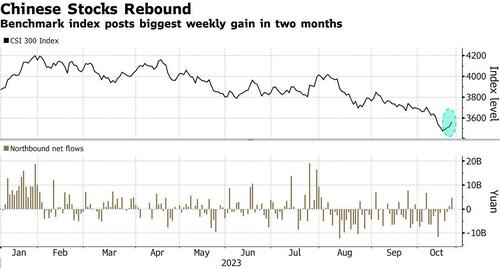From Fox Business, October 28:
John Podesta assembled with Rivian Automotive CEO Robert 'RJ' Scaringe and a team of his company's lobbyists
John Podesta, President Biden's
clean energy czar, quietly assembled with the head of an electric
vehicle (EV) company that relies heavily on taxpayer handouts and has
floundered financially since its inception, White House visitor logs
reviewed by Fox News Digital show.
According to
the records, Podesta privately met with Rivian Automotive CEO Robert
"RJ" Scaringe; the company's senior policy director, Chris Nevers; its
senior public policy manager, Corey Ershow; and Izzy Klein, a lobbyist
for the EV maker, at the White House in June. It is unclear what Rivian
officials discussed with Podesta, and both the company and the White
House didn't respond to requests for comment.
"Well, Podesta has
the largest slush fund, un-appropriated, probably in American history.
As soon as the Inflation Reduction Act (IRA) passed, Biden and company
announced it was actually an investment in green energy and yet it's not
appropriated to anything," Daniel Turner, the executive director of
Power the Future, told Fox News Digital. "So, it makes sense that Rivian
and other failing green energy companies are knocking on John Podesta's
door."
"The problem is that it will be sold to the American people as
investment, it will be sold to the American people as combating the
climate crisis," Turner added. "But it is just another example of
corrupt government paying off people who fund their campaigns and
deciding winners and losers when, at the end of the day, the real losers
are the American people who are paying astronomical amounts for basic
necessities because of this Biden economy."
Biden appointed Podesta in September 2022 to lead the White House Office of Clean Energy Innovation
and Implementation. Among its main tasks, Podesta's office has begun
implementing programs in the IRA, Democrats' $739 billion climate and
tax bill which enables the government to distribute more than $350
billion worth of loans and grants to green energy projects nationwide.
Department
of Energy Inspector General Teri Donaldson warned during a Senate
hearing last week that the IRA's unprecedented level of green energy
funding brings "tremendous risk to the taxpayers" and was ripe for abuse
and exploitation by foreign adversaries.
"You have massive
amounts of money moving quickly," Donaldson said. "All of these things
happening at once create a level of risk that may, candidly, be
unprecedented in terms of amounts of federal money moving in such a
complicated landscape."
Meanwhile, Podesta's gathering with Rivian, which has gone unreported, occurred as the California-based company
has hemorrhaged money on its zero-carbon vehicle production and turned
to government entities for financial support in the form of credits and
subsidies. Financial filings reviewed by Fox News Digital show the
company, which was founded in 2009, has lost billions of dollars since
it went public in 2021.
In 2022, Rivian lost a staggering $6.8
billion; in 2021, it lost $4.7 billion; and in 2020, it shed another $1
billion, according to the filings. And the company reported it produced
24,337 vehicles and delivered 20,332 vehicles last year, meaning the
company lost $33,087 per car delivered over the course of the entire
year.
Overall, Rivian's share price has nosedived more than 87% since its initial public offering in late 2021...
....MUCH MORE, including the Amazon deal and some political connections.
Related:
October 20
Takeaways From Tense Hearing On Department Of Energy Climate Spending
September 20 "Fact Check: Is Biden Advisor John Podesta in Naked Body Paint Photo?" File under: Things I wasn't expecting when looking to see what John Podesta was up to.
Big Money: "The $400 Billion Man Running America’s Clean Energy Transition"
No, not John Podesta, he only has $370 billion to dole out. (NYT, Sept 2, 2022)
Ford- Korea's SK Joint Venture To Get $9.2 Billion US Loan For Battery Plants
The Cost Of The Inflation Reduction Act Is Rapidly Inflating
"E.P.A. Is Said to Propose Rules Meant to Drive Up Electric Car Sales Tenfold"
This is President Obama's "I've got a pen [executive orders], and I've got a phone [administrative state]".
That was in January 2014 but the antecedents of this particular push go back to the University of Denver Law School in 2008* as justification for what they wanted Barack Obama to do if (when) he won the 2008 election.
This approach was favored by John Podesta, at the time, 2014 -2015, counselor to President Obama and currently in charge of the smaller but better known of the two green financial honeypots, which combined are doling out 3/4 trillion dollars.
From the New York Times....
April 12: "America’s $800bn climate splurge is feeding a new lobbying ecosystem"
Following on the mentions of John Podesta and the two huge honeypots of money in yesterdays "E.P.A. Is Said to Propose Rules Meant to Drive Up Electric Car Sales Tenfold"
here are some of the; I was going to say flies but the graphic looks
like locusts, the critters being attracted to the feast....
July 18 The Cost of The Inflation Reduction Act Has Inflated To Almost $1 Trillion
Wharton is going to get blackballed by the O'Biden-Harris
administration if they keep this up. They also released a study showing
that the cost of the Admin's student loan forgiveness would be in the
four-comma club as well:
Turley: "Wharton Study: Biden Tuition Debt Forgiveness Could Cost $1 Trillion"
This is the high end of the range Wharton was referencing just last week: Penn Wharton: "Forgiving Student Loans: Budgetary Costs and Distributional Impact".
I did catch the comments from the subsidy czar in May:
Increased green tax-credit costs are a sign of success, White House's Podesta says
Which,
when I saw it again this morning reminded me of a sales guy who,
whenever I raised an objection to whatever he was pitching would say
"That's they beauty of it." I finally asked him why he would say that
and he told me "It's the all purpose turnaround. I say it, it stops my
client's thoughts for a couple seconds and gives me time to figure out
what I want to say next."
I used a variation of it earlier today in the introduction to "
News You Can Use: "ESG' in US finance job titles comes with 20% pay premium'".



